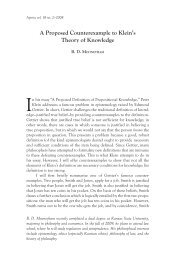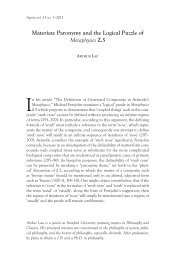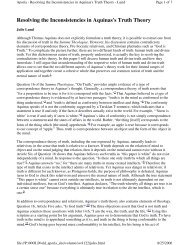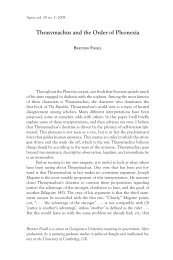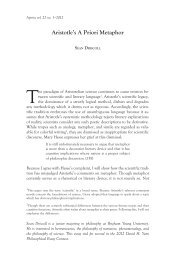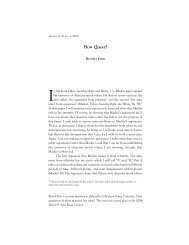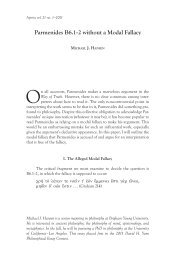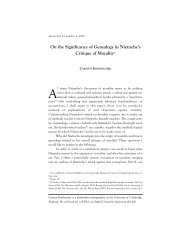Hermeneutics after Kant - Aporia - Brigham Young University
Hermeneutics after Kant - Aporia - Brigham Young University
Hermeneutics after Kant - Aporia - Brigham Young University
You also want an ePaper? Increase the reach of your titles
YUMPU automatically turns print PDFs into web optimized ePapers that Google loves.
82<br />
Nate NoorlaNder<br />
macher had. Schleiermacher’s method was clearly designed to eliminate<br />
any influence the subject might have on his understanding of the text.<br />
Until this influence is eliminated, he believed, the meaning he gets from<br />
it is “merely” subjective. Such an idea results when knowledge is equated<br />
with what is constant, measurable, and repeatable. These conditions for<br />
knowledge suggest that perspective and situation are inimical to “real,” objective<br />
knowledge. Stated in premise/conclusion form, this argument looks<br />
something like this:<br />
(1) We can have knowledge only of what is constant,<br />
measurable, and repeatable.<br />
(2) The subject necessarily interferes with constancy,<br />
measurability, and repeatability.<br />
∴ (3) Eliminating the influence of the subject is necessary<br />
for obtaining knowledge.<br />
Gadamer will argue against (1). His question, then, is whether it is true that<br />
we can have knowledge only of what is constant, measurable, and repeatable.<br />
Must all knowledge be obtained in accordance with the methods of<br />
the natural sciences? This is virtually the same question that was vaguely<br />
conceived by Schleiermacher: does knowledge mean something different in<br />
the human sciences than it does in the natural sciences?<br />
Gadamer’s answer is very Heideggerian in the sense that he does not<br />
believe that entities first show up in Dasein’s world and are subsequently<br />
understood, but instead that entities show up intelligibly in Dasein’s world<br />
for the very reason that they are already understood. This is because Dasein’s<br />
world is colored by its understanding of itself, by its comportment<br />
towards its own being. This comportment provides a context within which<br />
non-Daseins can show up. Non-Daseins are not so distant from Dasein<br />
that it must overcome itself to understand them. In fact, they are understood<br />
only within Dasein’s understanding of itself, the very subjectivity that<br />
scientism would have us eliminate. What is this subjectivity as it relates to<br />
hermeneutics and how does it help produce understanding? For Gadamer,<br />
it rests on the principles of tradition, prejudice, and application.<br />
The term “prejudice” commonly carries a negative connotation; it is<br />
popularly defined as an unfounded judgment. According to Gadamer, however,<br />
this usage stems from the methodological thinking we’ve discussed. In<br />
such thinking prejudices only interfere with true understanding and hence<br />
are always negative. But he says that the term “prejudice” actually means<br />
“a judgment that is rendered before all the elements that determine a situation<br />
have been finally examined” (Gadamer 273). We often overlook the<br />
fact that such judgments may be founded or unfounded. As Gadamer says,<br />
“There are such things as préjugés légitimes” (273).



